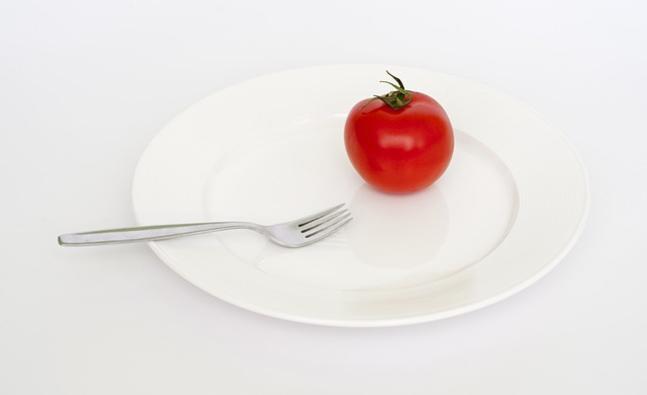What Happens to Your Body When You Skip a Meal
We've all been there: In an effort to drop a few pounds fast, you consider skipping lunch, thinking you can ride out the hunger pangs until dinner. Or you make your breakfast a measly glass of low-calorie green juice, assuming that the plants will provide the nutrients you're not getting from your usual milk and cereal. But here's the thing: Dealing with hunger pangs and an energy drain are only just the tip of the iceberg when it comes to what's going on in your body when you decide to forgo an entire meal. Let's take a peek and see what really happens:
For starters, skipping just one meal causes your blood-sugar levels to dive (or if it's breakfast, to never get out of the starting gate at all). "Sugar is the fuel your body runs on, and if it's not circulating in the right amounts, every organ in your body is affected," says Maggie Moon, R.D., a nutritionist based in Los Angeles. "You generally feel tired and unwell overall." Also, without a new supply of calories, your system shifts into starvation mode in an effort to conserve energy. Your metabolism slows, so the food you do eventually take in isn't burned off very efficiently.
Next, your brain takes a hit. "Without a steady supply of nutrients, your intellectual and emotional functioning changes," says Moon. You're foggy, and you become moody and irritable. When you do eat again eight or so hours later, your body feels relief—but it's short-lived. Your metabolism will stay low since it doesn't know when the next supply of calories is coming. And your blood sugar takes a plunge again, ushering in the low energy, brain fog, and mood swings you experienced all day. Keep the meal-skipping thing up, and your body might turn to your muscles as a fuel source, further sinking your metabolism and sapping your strength.
MORE: 7 Things You Can do in the Morning to Promote Weight Loss
Bottom line: Not only does skipping meals take a toll on your system, it conspires against you, setting you up for a slower metabolism and crazy hunger pangs that are tough to resist giving in to. The smart strategy? Lose weight by eating smaller, healthier meals throughout the day. "Make sure what you do eat is high-quality, nutrient-rich food: lean protein combined with carbs from whole grains and some monounsaturated good fats," suggests Moon. Ramp up your workouts so you burn more calories, as well. Losing pounds slowly by keeping your food intake up means your system will barely notice the difference—and you'll also be less miserable in the process.
MORE: 8 Easy Ways to Lose a Pound a Week
-
10 Science
In theory, losing weight is easy: You simply burn more calories than y
-
Why Eating Less and Exercising More Doesn’t Always Lead to Weight Loss
If you’ve managed to eat more veggies, cut back on sugar, and ma
-
How long does it take fat to reach our waistline?
-
Things to avoid when it comes to weight loss
-
Prevent weight gain by taking time to chew
-
How to curb your sweet tooth
- DON'T MISS
- 10 EATING SECRETS TO HELP YOU LOSE WEIGHT
- Crazy celeb diet tricks: The HCG diet
- Two easy strategies for keeping off the kilos!
- Prevent weight gain by avoiding the cafeteria
- Reduce sodium intake and water weight gain
- Should You Tell Your Friends When You're Trying to Lose Weight? | Women's Health
- Latest diet craze gaining popularity
- 6 of the most addictive foods - Number 6 may shock you
- Go big on breakfast for easy weight loss
- Follow the right fat loss strategies




